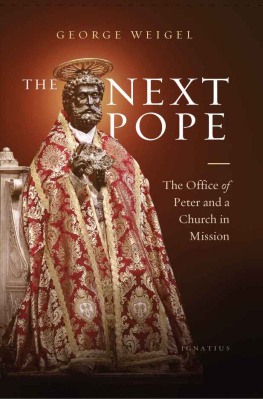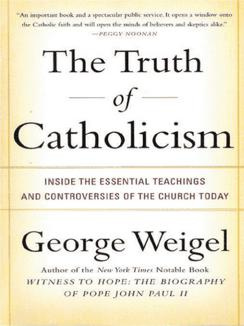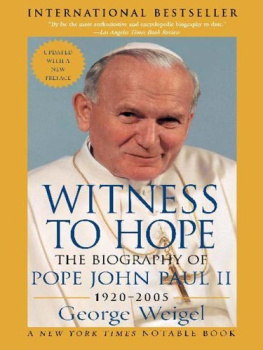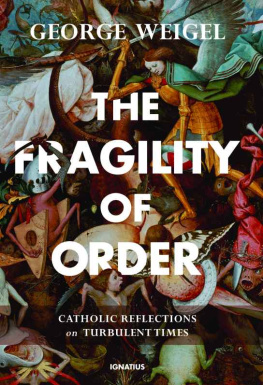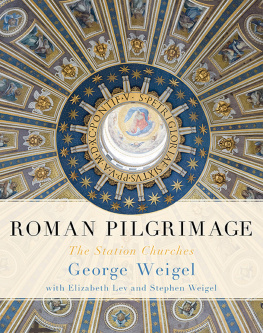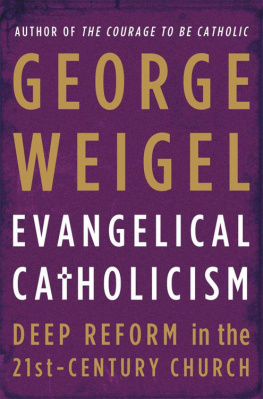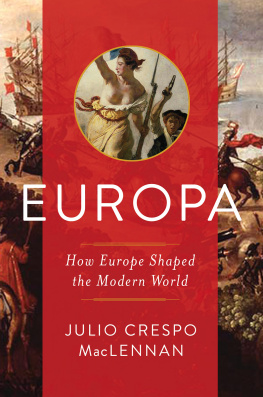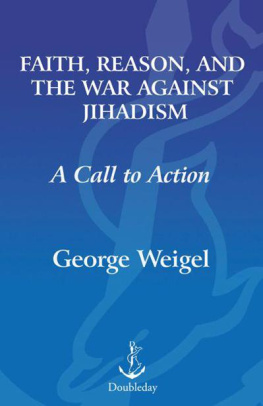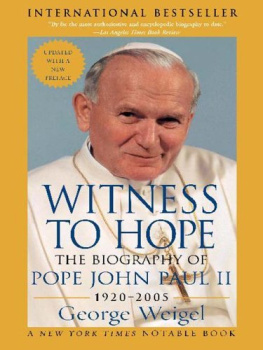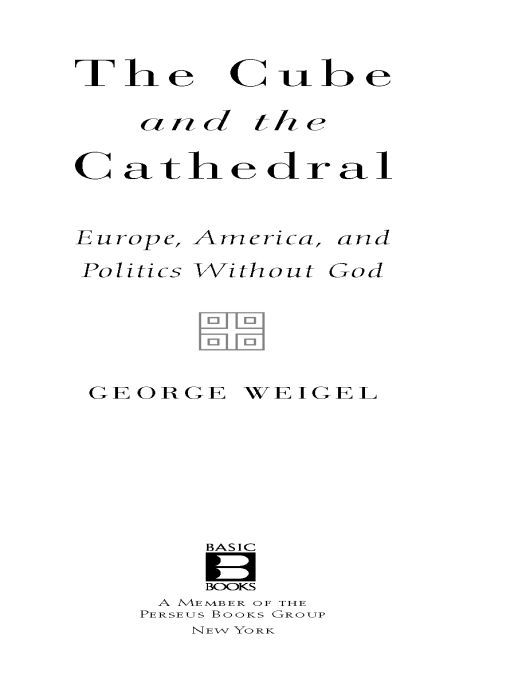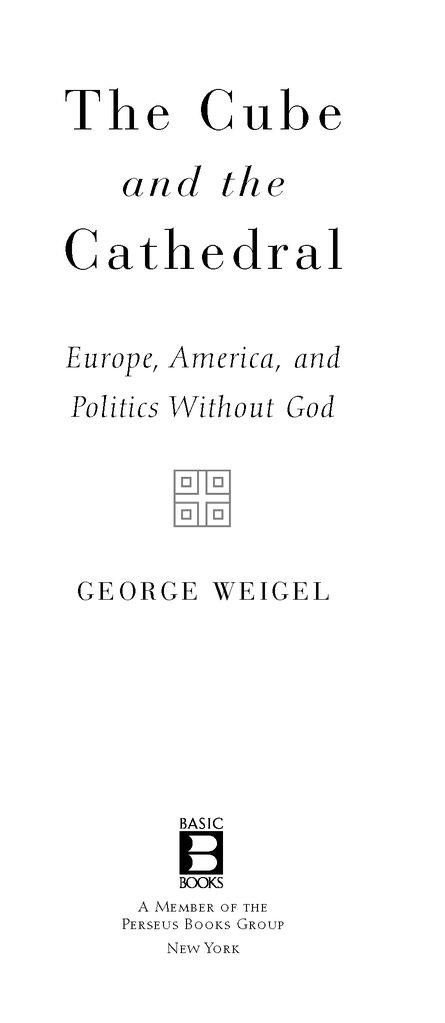Table of Contents
Praise for The Cube and the Cathedral
An engagingly written book.
Wall Street Journal
A finely honed reflection on post-Christian Europe.
Weekly Standard
A sumptuous banquet, stuffed with enough ideas for several books. Even to summarize the argument is a formidable task; Mr. Weigels prose is so rich.
New York Sun
Mr. Weigel is a past master at penning lively and lucid studies of contemporary issues.
National Catholic Reporter
Readers given to pondering European affairs will find much to pique thoughtful discussion.
Publishers Weekly
Weigels pithy polemic boldly assesses contemporary Europe... Sure to be much discussedand possibly to be remarkably influential.
Kirkus Reviews
Weigel has a nuanced and restrained vision for the role religion should have in public lifefor him, it should be a strong and welcomed voice in democratic debates, but not a voice that drowns out all others... thoroughly readable.
Tulsa World
A brisk look at the state of European culture and politics.
Washington Times
George Weigels impassioned essay on the strange death of European Christianity is at once an elegy and a warningan elegy for a venerable culture that is being effaced by a vacuous secularism, and a warning to Americans that their assumptions about a shared Western civilization are fast becoming obsolete on the Eastern side of the Atlantic.
Niall Ferguson, author ofEmpireandCollossus
In this elegant and highly readable book, George Weigel explains why Europe suddenly seems so distant from America, and why Americans have to be concerned with modern Europes flight from politics, its demographic crisis, and its willful forgetfulness of its civilizational roots. One hopes that Weigels book, like Tocquevilles reflections on America, will find a wide audience among those to whom he has held up a mirror. The Cube and the Cathedral is George Weigel at his bestlearned yet sprightly, deeply serious yet buoyantly hopeful.
Mary Ann Glendon, Learned Hand Professor of Law, Harvard University
ALSO BY GEORGE WEIGEL
Letters to a Young Catholic
The Courage To Be Catholic:
Crisis, Reform, and the Future of the Church
Tranquillitas Ordinis: The Present Failure and Future Promise of American Catholic Thought on War and Peace
Catholicism and the Renewal of
American Democracy
American Interests, American Purpose:
Moral Reasoning and U.S. Foreign Policy
Freedom and Its Discontents:
Catholicism Confronts Modernity
Just War and the Gulf War
(with James Turner Johnson)
The Final Revolution:
The Resistance Church and the
Collapse of Communism
Soul of the World:
Notes on the Future of Public Catholicism
Witness to Hope:
The Biography of Pope John Paul II
The Truth of Catholicism
Amicis Cracoviensibus Meis In Corde Europae
Questions Atop the Cube
At the far western end of the axis that traverses Paris from the Louvre down the Champs Elyses and through the Arc de Triomphe, crossing the Seine at the Pont de Neuilly, is La Grande Arche de la Dfenselike the more famous Pompidou Center, one of the grands projets of the late French president, Franois Mitterrand. Designed by Johann Otto von Spreckelsen, a Danish architect of sternly modernist sensibility, La Grande Arche is a colossal open cube: almost 40 stories tall, 348 feet wide, faced in glass and 2.47 acres of white Carrara marble. On a hot, sunny afternoon in August 1997, which is when I first saw it, La Grande Arche can be, quite literally, dazzling. A lift, definitely not for those inclined to vertigo, whisks the visitor up to a rooftop terrace, which offers an unparalleled view of the French capital, past the Tuilleries to the Louvre and on to the Ile de la Cit, Sainte Chapelle, and Notre-Dame.
The archs three-story-high roof also houses the International Foundation for Human Rights. For Franois Mitterrand intended La Grande Arche as a human rights monument, something suitably gigantic to mark the bicentenary of the French Revolution and the Declaration of the Rights of Man and Citizen. Thus, in one guidebook, La Grande Arche was dubbed Fraternity Arch. That same guidebook, like every other one I consulted, emphasized that the entire Cathedral of Notre-Dametowers and spire includedwould fit comfortably inside the Great Arch.
All of which raised some questions in my mind, as I walked along the terrace admiring one of the worlds great cityscapes. Which culture, I wondered, would better protect human rights? Which culture would more firmly secure the moral foundations of democracy? The culture that built this stunning, rational, angular, geometrically precise but essentially featureless cube? Or the culture that produced the vaulting and bosses, the gargoyles and flying buttresses, the nooks and crannies, the asymmetries and holy unsameness of Notre-Dame and the other great Gothic cathedrals of Europe?
More Questions
Those questions have come back to me, time and again, as Ive tried to understand what has happened in Europeand what has happened to western Europe in particularin recent decades: when I try to understand why Europes approach to democracy and to the responsibilities of the democracies in world politics seems so different from many Americans understanding of these issues. In the first years of the twenty-first century, and at a moment in history when the democratic ideal had energized much of the world, Americans suddenly seemed to be approaching a parting of the ways with many of our European friends in understanding the democratic projectits sources, its possibilities, and the threats to it. As an American acutely aware of the debt of gratitude my country owes to Europe, a widening rift between the United States and the countries and cultures from which America was born did not strike me as a happy prospect.
And still the questions came. They were intensified in the wake of 9/11, when, after an initial period of European solidarity with the United States, fundamental differences arose between the United States and its oldest allies on the question of how best to respond to the threat posed by international terrorism, especially terrorism that claimed a religious sanction from Islam. Yet as I explored these problems with European friends from both the long-established democracies of western Europe and the new democracies of east central Europe, it struck me that the rift between the United States and Europe on, say, the best means to disarm the Saddam Hussein regime in Iraq touched only the surface of things.
How, for example, should one understand the fierce argument in Europe over whether a new constitutional treaty for the expanding European Union should include a reference to the Christian sources of European civilization? Why were so many European intellectuals and political leaders determined, or so it seemed, to airbrush fifteen hundred years of European history from their collective memory? Why did those same intellectuals and politicians deem any reference to the Christian sources of contemporary Europes commitments to human rights and democracy a profound threat to human rights and democracy? Was there some connection between this internal European debate over Europes constitution-making and the events that caught the attention of American headline writers and TV news anchormenthe harsh words between Europeans and Americans over Iraq; the portrait in the European press of Americans (and especially an American president) as religious fanatics intent on shooting up the world; the vastly different respect afforded the United Nations by Europeans and Americans?


